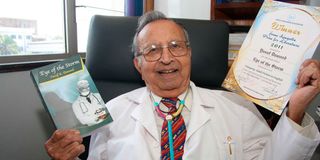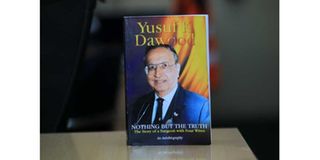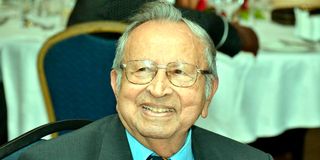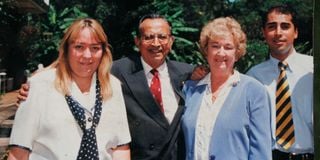I write to relax: What Dawood revealed about himself in book

Dr Yusuf Kodwavwala Dawood displays his book "Eye of the Storm" during a past interview with Sunday Nation.
A sentence in Yusuf Dawood’s autobiography is perhaps the most succinct summary of how he viewed life.
“After all, one has only one life and I want to live it meaningfully and with great intensity,” he wrote.
That line is on page 333 of the book Nothing but the Truth: The Story of a Surgeon with Four Wives, which he finished writing in December 2000 and which was published in 2002.
On that same page, Dr Dawood made a promise that rang true till he died last Sunday aged 94. His family confirms that up to 12 days before his death – which is the day he was carried to a London hospital and was admitted for his final hospital stay – he was writing not one but two books. This was despite his body becoming weakened by age-related complications. By then, he was confined to a wheelchair, couldn’t talk and couldn’t lift his left hand.
The promise read: “As long as my surgical judgement remains sound and I can safely wield a scalpel, I shall remain a surgeon. As long as my brain can conjure up stories – factual or fictional – and I can put pen to paper, I shall remain a writer. In this respect, I believe I will be able to hold the pen steadily for longer than the scalpel.”
He retired from surgery years ago as his hands lost the acuity required to conduct intricate surgeries. In a 2018 interview, he joked that the hands that used to do intricate surgeries could now no longer button a shirt. But he kept on writing till his final days on earth.
And, being a general surgeon in his early practice before he became a specialist on breast diseases, he recorded in his autobiography one of the greatest lessons about humanity. As a surgeon, he operated on various body parts and on people from diverse backgrounds.
“My multiracial surgical practice gave me a unique opportunity to enter not only the body but also quite often the heart and mind of people from different races, religions, social and cultural backgrounds. Operating on them all, I soon realised that in all cases the blood is red, the muscles are brown, the retina is black and the bones are white. Only the packaging is different, and the wrapper of a parcel is no indication of the quality of its contents!”
Did you know that all the stories he wrote in the Surgeon’s Diary were based on actual happenings? He would change names and ethnicity but everything else was true. Below are some of the other less-known facts that Dr Dawood reveals about himself in the book.
“Dawood” was meant to be a penname
The surgeon’s name was always Yusuf Kodwavwala. Until he ventured into writing. But he never seemed to like “Kodwavwala”, which he said gave many people a hard time pronouncing and writing it.
“The fact that my father originally hailed from [the village of Kodwav explains why I have been permanently lumbered with the surname Kodwavwala,” he wrote.
“There were good reasons for using a different name for the purpose of writing. My first concern was: how would the general public take to a surgeon in active practice writing novels, some of them with torrid love scenes? Perhaps a pseudonym might confer some immunity. Secondly, this was my chance to shed the ‘cross’ of Kodwavwala, which I had borne all my life,” he added.
So, on the cover of his first ever novel No Strings Attached that was launched in Nairobi on March 3, 1978, the author was indicated as “Yusuf K Dawood”.
“I have been writing under that name ever since,” he wrote.

Dr Yusuf Dawood's book - Nothing but the Truth: The Story of a Surgeon with Four Wives, which he finished writing in December 2000 and was published in 2002.
His late father was called Dawood but the name didn’t feature in any of his registration documents.
Incidentally, this provided a good chance to venture into charity because cheques to pay him for his books and for the Sunday Nation column were addressed to Dawood, “a fictional character” as he put it.
“I did not need that money and did nothing to correct the situation,” he wrote. “Money to me is the means to an end and not an end in itself. When the balance in the ‘writer’s’ account grew to sizeable proportions, I decided to set up a charitable trust in the name of my parents,” he stated.
He, however, noted that hiding behind “Dawood” and not using his proper name Kodwavwala did not place a veneer on him forever.
“Over the years, my ‘double life’ has been exposed. The camouflage that Dawood provided to Kodwavwala has gradually been eroded and is now totally transparent. But my readers don’t seem to mind,” he wrote.
He was born and raised in India, got most of his medical training in the UK and came to Kenya in 1961 to work at the Aga Khan Hospital. He left Kenya for the UK in 2018 to join his family. He had homes in Kenya (Muthaiga, at the edge of Karura Forest) and in the UK (overlooking the River Thames). It is at the UK home that he spent his final years and wrote his final piece of the Surgeon’s Diary in late 2021.
Writing was his way of relieving stress
Dr Dawood wrote that he was influenced to join the craft by the doctors-cum-writers he used to read. They made him discover that he would mix literature and science.
Also, as he established himself as a surgeon, the job brought with it lots of stress that could be dissipated through writing.
“Obviously, my tensions were bottled up and needed a healthy outlet, lest they explode. What better way to do it than to write a novel? In a work of fiction, I reckoned, I could depict all my adversaries as villains and all my supporters as heroes and free myself from all my complexes in one stroke,” he wrote.
“In time, writing became a process of catharsis, proved to be a personal panacea and worked as a balm for my jangled nerves. It even helped to maintain my sanity,” he wrote.
That was the motivation that saw him write 12 books, some that are fiction and others that were a compilation of his Surgeon’s Diary articles. His son, Jan, told Lifestyle that the two books he was writing till his last days will be edited and forwarded to publishers. That is likely to push the tally of Dr Dawood’s published books to 14.

The late Dr. Yusuf Kodwavwala Dawood. He retired from surgery years ago as his hands lost the acuity required to conduct intricate surgeries. In a 2018 interview, he joked that the hands that used to do intricate surgeries could now no longer button a shirt. But he kept on writing till his final days on earth.
When doing his first novel, he often wrote on weekends while locking himself inside his study room.
“Every Saturday and Sunday afternoon, I sat closeted in my study, writing in longhand with an irrepressible urgency. On some days, ideas and expressions flowed easily, and the writing seemed strangely dictated by powers I did not think I possessed. But there were other days, too, when writer’s cramp and mental blocks stopped me from writing a single word,” he said in his autobiography.
The first “Surgeon’s Diary” article ran in May 1980
Imagine narrating a story before an audience and in the process attracting the attention of a newspaper editor. That is what happened to Dr Dawood. He had been forced to give a speech in a meeting for members of a Rotary club in Nairobi after the person who was to speak fell ill.
He found himself telling the gathering the story of how he cured a boy with Hodgkin’s lymphoma using a new medication formula.
“As my fellow Rotarians came up to the rostrum to congratulate me on my off-the-cuff performance, I could see Joe Rodrigues, the Editor-in-Chief of the Nation group of newspapers, waiting in the wings. It was typical of the man — a quiet worker who had risen from humble beginnings to the top of his profession,” he wrote.
“When the hand-shaking was over, Joe came up to me. ‘Could you put this in writing?’ He inquired. He was very softly spoken and I could barely hear him. ‘Why?’ I asked. ‘You know I spoke ad-lib.’ ‘Because for years I have been looking for something like this to go as a regular column in the Sunday Nation,’ he replied.”
That started the process that led to the column. He had suggested a couple of names for it, among them Pearls from My Ocean, Roses in My Garden and Stars in My Sky.
“The features editor, Rashid Mughal, brought me down to earth and christened it Surgeon’s Diary. And it took off. The first episode, entitled ‘The Eye of a Needle’, appeared in the Sunday Nation of May 25, 1980,” wrote Dr Dawood.

Dr Yusuf Dawood and his wife Marie and their children Jenny (left) and Jan (right).
He added that penning the diary became his “biggest literary achievement and has brought me many plaudits”.
“Perhaps the biggest selling point of the Diary is its notion that truth is stranger than fiction. After all, real-life stories are indeed the most fascinating,” he wrote.
He interacted with Kenya’s high and mighty
From treating members of the Kenyatta family to direct interactions with ministers, Dr Dawood rubbed shoulders with Kenya’s who’s who. Some of those interactions happened due to his job as a surgeon and others because of his involvement with Rotary clubs. He was the governor of Rotary District 9200 from 1989 to 1990. The district encompassed Kenya and 12 other countries. That saw him travel a lot and to interact with various leaders.
As a surgeon, he wrote about operating on a member of the Kenyatta family – whom he did not name. He carried out surgery to remove her uterus as she had been bleeding incessantly.
And in one of the photos contained in his autobiography, Mama Ngina Kenyatta and Beth Mugo are captured at a “social function” at Dr Dawood’s home in 1974.
He also had interactions with the likes of Charles Njonjo. Mr Njonjo, who died in January 2022, was the guest of honour at the launch of Dr Dawood’s first book. He was then the Attorney-General.
“On that fateful day [March 3, 1978], I became a published writer, acquired a third wife and adopted a new name,” he wrote.
In the Rotary circles, he also interacted with the then Foreign Minister Robert Ouko in Kisumu just days before he died.
He met his wife at a British hospital
Both Dr Dawood and his wife Marie were working in a hospital set-up when they met and fell in love.
“Banbury [in south-east England] will always be a happy landmark for me because it was there that I met Marie,” he wrote. “Marie and I first met in the operating theatre of the Horton General Hospital in Banbury and during the following weeks found ourselves gradually falling in love, in spite of the surgical masks covering our faces.”
Marie used to work as a nurse and when he moved to another hospital, she readily accepted his request that she transfers to a facility closer to where he was.
Shortly after, he decided to marry her. But he was not sure how his people back at home would respond. He knew they could hardly stand the idea of him marrying a woman from another region and another culture altogether. If he married from where he came from, his family would get a dowry from the family of the woman he would marry. And given that he was a surgeon, he writes, he would have fetched a handsome return.
Regardless, the two would wed on May 24, 1958, at Caxton Hall in London.
None of his children ventured into medicine
Jan, and Jenny, the son and daughter of the Dawoods, chose careers away from the medical field.
“I have often been asked if either of my children has followed my nyayo – my footsteps – and taken up surgery. When I reply in the negative, the questioner is either surprised or disappointed. I am neither. Times have changed and exciting new careers have appeared on the horizon. The ‘prestigious professions’ of my time have lost some of their lustre and no longer attract the younger generation,” he wrote.
“In any case, medicine is a personalised vocation and not everybody’s cup of tea. Indeed, some people like to be in control of their lives rather than be on call 24 hours a day,” he added, noting that Jenny ventured into IT while Jan is interested in people – “healthy people, not sick ones like I am”.
Dr Dawood came to Kenya as a general surgeon.
“My operation lists included entry into every body cavity: head, neck, chest and abdomen. I dealt as freely with soft tissues as I did with hard bones. I operated on both adults and children and even the female pelvis did not escape my attention. This was simply because there was a great dearth of specialists, not only in Kenya but also in the entire region which I served at that time,” he wrote.
Later, when specialisation took over the surgery field, he chose to focus on breast diseases and opened a clinic for the same.
“My human interest in breast cancer was aroused much later when I started working in Nairobi. I soon learnt that losing a breast was much more traumatic to a woman than losing a leg was to a man. It was psychologically a devastating experience for her,” he wrote.
In all, Dr Dawood was reflective and candid in his biography, which he finished writing at 72 when he was being called “mzee”. He thought he might pen a sequel someday.
“Indeed, I am hoping that there will be time for an addendum, a postscript, a final summing up. Who knows, with a bit of luck there might even be a sequel,” he wrote. But with his death, that luck was not to be.
And he hoped that the foundation he founded – which received all the monies he earned from writing to assist various causes – would continue helping society for posterity.
“So, when my books have become antiquated and the writing of the Diary ceases as a result of natural attrition, I have no doubt that the [Marie Rahima Dawood Foundation] will continue to do good in the world,” he wrote.





